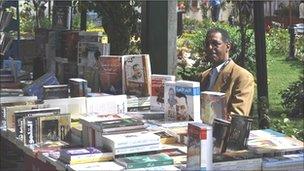Book fair brings new dawn for publishing in Egypt
- Published

A book fair in Tahrir square was held in lieu of the annual fair which was cancelled in January
In January publishers and book sellers from around the world came to Egypt for the annual Cairo book fair.
President Hosni Mubarak was set to cut the ribbon on the 43rd inauguration of oldest and the largest book fair in the Arab world.
But as revolution rocked the country, book-buying was far from the minds of those gathered in the city and the fair was cancelled.
At the beginning of April, booksellers once again descended on Cairo for a substitute fair, organised by the American University of Cairo Press, and held in the now iconic Tahrir square.
With the possible exception of Lebanon, Egypt is the principal centre of publishing for Arabic-speaking countries.
Held in the climate of post-revolutionary Egypt, the fair will have major impact on new literature across the Middle East.
Yasmine el Dorghamy is an Egyptian publisher and founder of the Egypt Heritage Review Magazine.
"Writers and poets have been inspired" she says. She believes that literature had a huge part to play in the revolutions in Egypt and beyond.
"Indeed these events don't just happen suddenly. It is like an engine that needs to be warmed up. It's writing that pushed the people out [on to the streets] and vice versa."
Political change could herald a very exciting period for publishing in the country.
"Now we can say whatever we want, we can publish whatever we want."
She predicts a huge upsurge in new magazines and newspapers now that the "chains" of Mubarak's regime are gone.
Many of the visitors at Tahrir square share in this enthusiasm and hope for the future including one young woman who perused the book stalls excitedly.
In he past few years the fair has succeeded in attracting more than 2 million visitors
"A few years ago many Egyptians didn't read," she said, "but recently they started reading. Me and my friends read a lot of opposition newspapers and that brought attention to corruption that was happening."
In previous years the fair came under criticism from some quarters who claimed it was complicit in censorship, banning certain books that were critical of the government and those with more sexually explicit themes.
Last year, security forces raided the fair and physically removed all copies of a book that criticised Libyan leader Muammar Gadaffi, an official friend of the regime. The book's publisher was arrested and detained.
But the climate this year is very different.
Trevor Naylor, Associate Director of the American University in Cairo Press Bookstore, first pushed for the substitute book fair to support local bookshops who were bitterly dissapointed when the original was cancelled.
But this year he says the real impetus of the event is to keep freedom of speech high on the agenda in the movement towards democracy.
"Almost every aspect of daily life, whether selling books or just normal conversation, has a revolutionary flavour to it. It completely dominates all thinking and creative output at the moment."
He expects this sentiment to spread to Egypt's neighbours for whom the country has always been a major source of books.
But the spread of ideas is heavily dependent on a country and its people being free to receive them.
"The whole of the Middle east is a creative writing centre" he asserts. "If everybody is able to express their own voice in their writing then I think there will be a great cultural interchange."